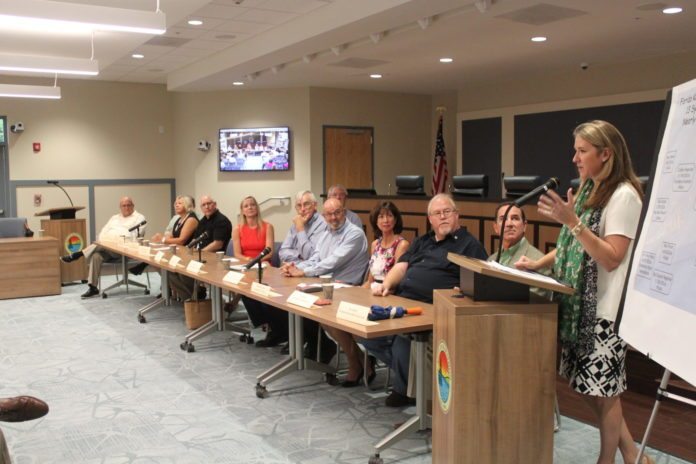Department of Economic Opportunity Director Cissy Proctor speaks to agency representatives at Marathon City Hall during Thursday’s Sewer Celebration. SARA MATTHIS/Keys Weekly
20 years & $1 billion
On Thursday, representatives from many agencies and municipalities gathered at Marathon City Hall to formally declare the sewering of the Keys complete. It took almost 20 years, $1 billion, and involved eight separate utilities/cities and 13 systems from Key Largo to Ocean Reef.
The occasion was put together by Monroe County and guests included representatives from Ocean Reef, Marathon, Layton and Key West. Also in attendance were Florida Keys Aqueduct Authority’s Kirk Zuelch, state Rep. Holly Raschein, Department of Environmental Protection’s Gus Rios and Department of Economic Opportunity Director Cissy Proctor. Representatives from the Key Largo Wastewater District were unable to attend.
Key West, Layton and Ocean Reef were the first to complete their projects; only Marathon has completed its stormwater mandate as well. It was a huge undertaking. First, Marathon leaders had to convince the populace the state wasn’t kidding around; sanctions would be imposed if the original 2010 deadline wasn’t met. Second, there was a way to finance it.
“Most importantly, it was the right thing to do,” said Peter Rosasco, former finance director for the City of Marathon. “The conditions of nearshore waters were deplorable. Our entire economy was going to be affected if we didn’t act.”
He commends many locals for their city leadership, among them Marathon Councilman John Bartus, and former councilmen Chris Bull, Mike Cinque, the late Dick Ramsay, Pete Worthington, Ginger Snead, Randy Mearns and Marjorie Mearns. Beyond swaying public opinion, there were more hurdles for Marathon – namely, how to finance what would amount to a $140 million project, and who would build it.
Rosasco said Marathon was among the first of local governments to make use of a new program called the State Revolving Loan funds. The federal money was available to state governments to dole out at very reasonable terms.
“They were 20 years at 2 percent,” Rosasco said. “In addition, we decided to take on the design and build of our own systems rather than rely on FKAA or the county. We had to convince the state Department of Environmental Protection to let us do it.”
Raschein was still in college when the state mandate passed. She watched from the sidelines as an aide while her predecessors, Ken Sorenson and Ron Saunders, tackled the issue.
“I kept thinking, ‘How many more millions do we need?” she told the audience assembled at Marathon City Hall. “Part of me wishes we could have had this Sewer Celebration at night, so there could be fireworks. It’s that big.”



























